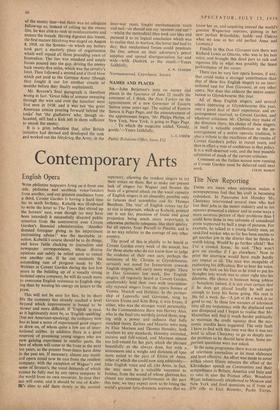Contemporary Arts
English Opera
WrrH philistine taxpayers firing on it from one side, philistine and snobbish voice-fanciers from another, and our greatest conductor from a third, Covent Garden is having a hard time for its tenth birthday. Kubelik was ill-advised to write the letter to The Times that stirred up the hornets' nest, even though (as may have been intended) it successfully diverted public attention from the controversy over Covent Garden's financial administration. 'Another damned foreigner giving us his impertinent patronising advice!' was the inevitable re- action. Kubelik's course should be to do things, and leave futile clacking to journalists and newspaper correspondents, whose diverse opinions can safely be relied upon to cancel one another out. If he can maintain the astonishing rate of progress made by Mr. Webster at Covent Garden during the last few years in the building up of a vocally strong national opera company, he will do much more to overcome English resistance to English sing- ing than by wasting his energy on letters to the press.
This will not be easy for him. In its 'short life the company has already reached a level beyond which improvement is bound to be slower and more difficult. If 'English' is read, as it legitimately must be, as 'English-speaking' (but not American-speaking), the company now has at least a score of experienced good singers to draw on, of whom quite a few arc of inter- national calibre. In addition there is a good reservoir of promising young singers who are now gaining experience in smaller parts, the best of whom will come to the front in the next ten years, as the present front-liners have done in the past ten. If necessary, almost any stand- ard opera could now be cast from the resident company, with the exception of Wagner's and some of Strauss's, the vocal demands of which cannot be fully met by any opera company in the world from its own resources. In time they too will come, and it should be one of Kube- Ilk's aims to add them slowly to the normal
repertory, allowing the resident singers to try their voices on them. But to make our present lack of singers for Wagner and Strauss the basis of a general attack on the vocal capacity of English singers is an absurdity possible only to fatuous deaf xenophiles and Sir Thomas Beecham. The 'size' of English voices (as far as size is important, which as Kubelik pointed out is not far, precision of focus and good projection being much more important) is otherwise perfectly adequate, like their quality, for all operas, from Purcell to Puccini, and is in no way inferior to the average of any other country.
The proof of this is plainly to be heard at Covent Garden every week of the season, but for those snobs who do not know how to judge the evidence of their own ears, perhaps the testimony of Mr. Christie at Glyndebourne, certainly not noted for favouritism towards English singers, will carry more weight. There in Don Giovanni last week. five 'English' singers, all regularly heard at Covent Garden, comfortably held their own with internation- ally reputed singers from the opera houses of Vienna. Munich and Helsinki. In the partner- ship of Leporello and Giovanni. sung by Geraint Evans and Kim Borg, it was Evans, if either, who was the stronger vocal. personality. As the Commendatore there was Hervey Alan, who in the final trio worthily joined them, sing- ing with a power and richness that fully matched theirs. Zerlina and Masetto were sung by Elsie Morison and Thomas Hemsley, both excellent by any standards, HemsIcy animated, incisive and full-voiced, and Morison almost too full-voiced for her part, which she phrased beautifully as she always does, but 'with a seriousness and a weight and darkness of tone more suited to the part of Elvira or Anna, either of which she could now sing admirably— little English voice and all. (As Anna, in fact, she may soon be a valuable successor to Jurinac, from the sound of whose glorious but almost too immense performance in the part this time, we may expect soon to be losing the world's greatest lyric-dramatic soprano that we
know her as, and acquiring instead the world's greatest Wagnerian soprano, gaining in her new •perfect Brannhilde, Isolde and Elektra what we lose in her old perfect Anna and Leonora.)
Finally in this Don Giovanni cast there was Richard Lewis as Ottavio, who was in his best voice, and brought this dead part to rich and vigorous life in what was possibly the finest performance of his career.
There can be very few opera houses, if any, that could make a stronger contribution than that of these five English singers to an inter- national cast for Don Giovanni, or any other opera. Nor does this exhaust the native contri- bution to Glyndebourne this Year.
All of these English singers, and several others appearing at Glyndebourne this year, owe.a good deal of their experience, and en- couragement received, to Covent Garden, and whatever criticisms Mr. Christie may make of the direction there, his choice of these singers, in itself a valuable contribution to the en- couragement of a native operatic tradition, is also a tribute to the excellence of the results of Covent Garden's policy in recent years, and thus in effect a vote of confidence in that policy. It is a well-deserved vote, and the best possible refutation of much of the current criticism.
Comment on the Italian season now running at Covent Garden must be deferred until next
week. COLIN MASON


































 Previous page
Previous page